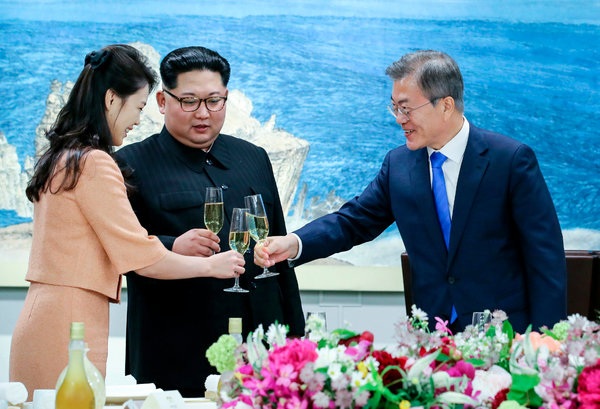News Analysis |
North Korean leader Kim Jong Un’s crossing of the border to reach demilitarized zone between two Koreas and meet his South Korean counterpart marked history in many ways. A handshake became the center of media attention all over the world. The visit and subsequent meetings between the leaders of the conflict-torn region brought a feeling of optimism for the sustainable peace in the Korean peninsula.
A deal was signed between the two leaders which expressed a shared commitment to ending a seven-decade-long war and to the surprise of many “denuclearization of Korea”. It was specifically mentioned by South Korean officials to their US counterparts that making Kim agree to give up his nuclear edge would not be easy. They believed that it will take a gradual course of bilateral dialogue before even the term of “denuclearization” starts becoming part of mutual press releases.
But Kim Jong Un told President Moon of South Korea that his country will concede the nuclear weapons it possesses if the United States agreed to formally end the Korean War and promise not to invade his country, South Korean government said on Sunday. The response from Washington was not quite overwhelming given the history of North Korean discourse about such commitments in the past.
While the tensions in Korean Peninsula seem to be de-escalating, the strains in US-Iran ties are exacerbating. President Trump has indicated the time and again that he is willing to pull US out of the P5+1 Iran nuclear deal signed in 2015.
However, US laid out a plan that they will be negotiating with the North after Kim and Trump convene at the end of this month. The plan’s goal is complete denuclearization of Korea over the span of two years. That would be accompanied by a “full, complete, total disclosure of everything related to their nuclear program with a full international verification,” said John R. Bolton, Mr. Trump’s new national security adviser.
Read more: North Korea says historic summit opens ‘new era for peace’
Experts of international relations, particularly those residing in West, are still skeptical about the rapid diplomatic developments which North seems to be savvy of, as the year 2018 kicked in, expressing doubts that it could all be another hoax. The details of talks between two Korean leaders are revealing days after the visit is over.
South Korean government spokesperson, Yoo Young-Chan, went on to add remarkable details, giving a rare insight of what North Korean leader feels about US people and the perception they have about him. “I know the Americans are inherently disposed against us, but when they talk with us, they will see that I am not the kind of person who would shoot nuclear weapons to the south, over the Pacific or at the United States,” Mr. Kim told Mr. Moon, according to Mr. Yoon’s account.
The willingness to give up the nuclear weapons was even reinforced by US secretary of state Mike Pompeo who had a secret meeting with Kim Jong Un over Easter weekend. In what Pompeo went on to call a “good conversation”, he broke the update to the world while talking to ABC News that Kim is willing to “lay out a map that would help us achieve [the desired denuclearization]”.
Read more: Actress kidnapped by North Korea dies at 91
Apart from the dubious North Korean history of backtracking, United States faces another geopolitical challenge if it opts to leave South Korea. China shares a border and has deep ties with North Korea. In case both Koreas decide to unite, due to geographical proximity, embedded cultural and economic ties, it will come under the direct influence of China. A country which has been challenging United States hegemony by swift growth of its economy and military might.
North Korean leader Kim Jong Un’s crossing of the border to reach demilitarized zone between two Koreas and meet his South Korean counterpart marked history in many ways. A handshake became the center of media attention all over the world.
Giving up another region to China’s influence would not be an easy decision to make for Trump administration. Ostensibly the ball has been pushed to the South Korean side of the half to be maneuvered as it is now them and their ally United States who will be pondering upon the prospects of pulling out of US troops from the peninsula.
Read more: Sanctions on North Korea compelled Kim to meet Trump
Though Kim has not clearly stated what form of guarantee does he want, he will certainly take US troops flying back to their country as one. Whatever it is, deception tactics or genuine longing for peace from North Korea, it has certainly made the US perplexed about the decision it is going to make. The mounting pressure from world powers, especially China and Russia, to see the averting of potential nuclear standoff once and for all is real. Though reluctantly, US might have to take the bait which Kim is offering.
While the tensions in Korean Peninsula seem to be de-escalating, the strains in US-Iran ties are exacerbating. President Trump has indicated the time and again that he is willing to pull US out of the P5+1 Iran nuclear deal signed in 2015. Analysts opine that this possibility cannot be ruled out in the post-Korean Peace Summit since this summit has enabled the US to focus more on Iran while not worrying about Kim’s jingoism. Kim seems to be serious about de-nuclearisation of Koreas but whether President Trump would reciprocate with a massive offer of his own is yet to be seen.














